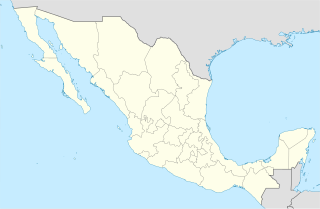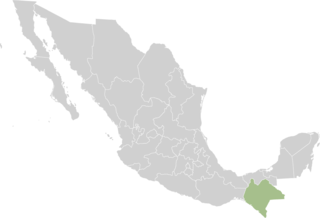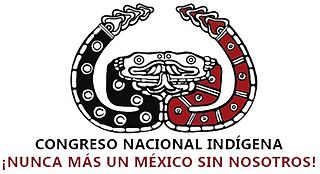
The Zapatista Army of National Liberation, often referred to as the Zapatistas[sapaˈtistas], is a far-left libertarian-socialist political and militant group that controls a substantial amount of territory in Chiapas, the southernmost state of Mexico.

Ernesto Zedillo Ponce de León, is a Mexican economist and politician. He was President of Mexico from 1 December 1994 to 30 November 2000, as the last of the uninterrupted 71-year line of Mexican presidents from the Institutional Revolutionary Party (PRI).
Subcomandante Elisa is a Mexican activist from Monterrey, Nuevo León. in the 1980s and early 90s, she served as a subcomandante in the Zapatista Army of National Liberation (EZLN). She was arrested in February 1995 in connection with the 1994 Zapatista uprising. In 1996, the Mexican government acknowledged it was a wrongful arrest and acquitted her of all charges. Today, she is a professor at the Autonomous University of Social Movements.

Comandanta Ramona was the nom de guerre of an officer of the Zapatista Army of National Liberation (EZLN), a revolutionary indigenous autonomist organization based in the southern Mexican state of Chiapas. Perhaps the most famous female Zapatista actor, Ramona was one of seven female commanders in charge of directing an army that consisted of one-third women. A member of the Zapatista leading council, the CCRI, she served as a symbol of equality and dignity for indigenous and impoverished women.

A Place Called Chiapas is a 1998 Canadian documentary film of first-hand accounts of the Ejército Zapatista de Liberación Nacional (EZLN) the and the lives of its soldiers and the people for whom they fight. Director Nettie Wild takes the viewer to rebel territory in the southwestern Mexican state of Chiapas, where the EZLN live and evade the Mexican Army.
The San Andrés Accords are agreements reached between the Zapatista Army of National Liberation and the Mexican government, at that time headed by President Ernesto Zedillo. The accords were signed on February 16, 1996, in San Andrés Larráinzar, Chiapas, and granted autonomy, recognition, and rights to the indigenous population of Mexico.
Neozapatismo or neozapatism is the political philosophy and practice devised and employed by Mexico's Zapatista Army of National Liberation, who govern a large territory in Chiapas and have done so since the beginning of the Chiapas conflict. Crucially, it is not an ideology, as the Zapatistas' The Clandestine Revolutionary Indigenous General Command, has made clear: "Zapatismo is not a new political ideology or a rehash of old ideologies … There are no universal recipes, lines, strategies, tactics, laws, rules or slogans. There is only a desire: to build a better world, that is, a new world."

San Andrés Larráinzar is a town in the Mexican state of Chiapas. It serves as the municipal seat for the surrounding municipality of Larráinzar.

The Chiapas conflict refers to the 1994 Zapatista uprising, the 1995 Zapatista crisis and their aftermath, and tensions between the indigenous peoples and subsistence farmers in the Mexican state of Chiapas from the 1990s to the present day.
On January 1, 1994, the Zapatista Army of National Liberation (EZLN) coordinated a 12-day Zapatista uprising in the state of Chiapas, Mexico in protest of NAFTA's enactment. The revolt gathered international attention.

Rafael Sebastián Guillén Vicente is a Mexican insurgent and former military leader and spokesman of the Zapatista Army of National Liberation (EZLN) in the ongoing Chiapas conflict. Widely known by his previous nom de guerre as Subcomandante Marcos, he has recently used several other pseudonyms; he referred to himself as Delegate Zero during the 2006 Mexican Presidential Campaign. In May 2014, he adopted the name of his dead comrade "Teacher Galeano", naming himself Subcomandante Galeano instead.
Radio Insurgente is the official voice of the Zapatista Army of National Liberation (EZLN).The radio station has been operating since August 2003 and it is independent from the Mexican government. Its broadcasting location is unknown. Radio Insurgente's content is focused on promoting the ideas and struggles of the Zapatista movement. Radio Insugente transmits programs in Spanish and in the indigenous languages tzotzil, tzeltal, chol and tojolabal. According to their website, they transmit "from various places in Chiapas directed to the Zapatista bases, the insurgentes and milicians, the commanders and local people in general". No new programs have been posted on the website since 2009, but CDs are on sale on the site and users can listen to previous content.
Zapatista Coffee Cooperatives primarily operate in Chiapas, the southernmost state of Mexico following Zapatismo ideology.

A series of unofficial referendums on elections, political reforms and electoral participation was held in Mexico on 27 August 1995. It was organised by the Zapatista Army of National Liberation (EZLN), who proposed a detailed reform for democratization, that the country engage in free and reformed elections and that the EZLN convert itself into a political party and form a united front with other opposition parties. Another referendum question sought to establish equality for women in government and administration. All these measures passed, but this unofficial referendum appears to have had little effect on Mexican governance.

Women have been influential in the Zapatista Army of National Liberation (EZLN) Ejército Zapatista de Liberación Nacional, a revolutionary leftist group in Chiapas, Mexico, by participating as armed insurgents and civil supporters. In the 1990s, one-third of the insurgents were women and half of the Zapatista support base was women. The EZLN organization style involved consensus and participation by everyone, including women and children. Therefore, one aspect of the EZLN's ideology was gender equality and rights for women. After the Zapatista uprising in Chiapas, the EZLN announced the Women's Revolutionary Law which was a set of ten laws that granted rights to women regarding marriage, children, work, health, education, political and military participation, and protected women from violence. Prominent figures who joined the movement early on such as Comandante Ramona and Major Ana Maria encouraged other women to join the Zapatistas.

Rebel Zapatista Autonomous Municipalities are territories controlled by the Neo-zapatista support bases in the Mexican state of Chiapas, founded in December 1994.
Max García Appedole is a Mexican entrepreneur and political activist. Appedole is considered an important advocate for the Mexican Government's peaceful solution with the Zapatista Army of National Liberation (EZLN).

The National Indigenous Congress is an organization of communities, nations, towns, neighbourhoods and indigenous tribes of Mexico. In its own words, the CNI is "... a space of unity, reflection and organization of the indigenous peoples of Mexico, promoting the integral reconstitution of the original peoples and the construction of a society in which all cultures, all the colors, all the towns that we are Mexico". Since its foundation, among several activities, five national congresses have been held.
Zapatourism is a touristic phenomenon in the Mexican state of Chiapas caused by the presence of the Zapatista Army of National Liberation. International and national tourists visit the area attracted by the message, image or policy of the Zapatista movement which claims to provide autonomy, dignity and freedom of the local indigenous communities. The rebel communities and municipalities in the zone are the entrance to this anti-globalization movement, phenomenon which is also called "political tourism".